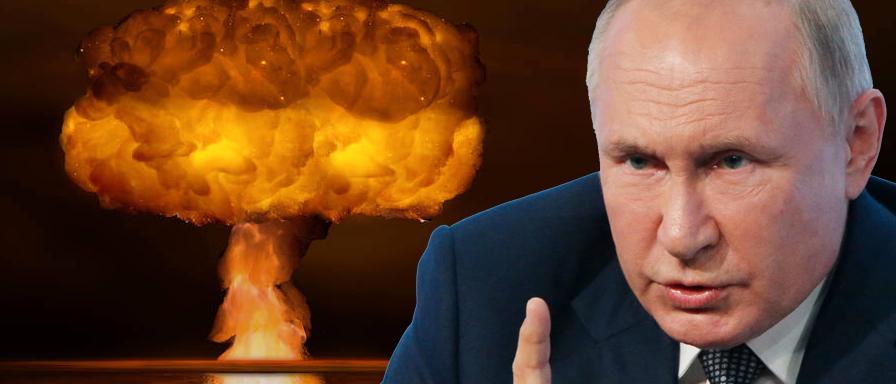unsaveSave
expand-left
full screen The White House called for crisis deliberations after the information about Russia’s nuclear weapons plans. Photo: AP
Intercepted communications within the Russian military prompt the White House to draw up plans for a response.
The threat being discussed is an attack with tactical nuclear weapons.
The CIA estimates the risk to be “50-50” if Ukraine succeeds in repelling the Russian offensive.
ⓘ The summary is made with the support of AI tools from OpenAI and quality assured by Aftonbladet. Read our AI policy here.
Show more
chevron-down
Suddenly during a speech to Democratic contributors, President Biden painted a terrifying possible scenario for the future.
– For the first time since the Cuban Missile Crisis, we have a direct threat of nuclear weapons if things continue on the beaten track, Biden said.
It was October 6, 2022, and the president had just received a top secret report in his hands.
Discussed an American response
The content of the report gave rise to crisis deliberations about what an American response would look like if the worst were to occur.
It also led to a secret meeting between the US and Russia’s top spies.
German Chancellor Olaf Scholz and Chinese President Xi Jinping were also drawn into crisis management after the uncanny information that the CIA claimed to have intercepted.
Hitherto unknown details about the crisis that shook the White House in the fall of 2022 has now been revealed in an investigation by The New York Times.
The report presented to President Biden during an Oval Office briefing contained intercepted communications from within the Russian military leadership.
Talked about detonating nuclear weapons
For the first time since Russia began the invasion of Ukraine, discussions had been intercepted in which nuclear weapons were discussed and the possibility of using them during the war, writes The New York Times.
Some of the intercepted conversations were from within the units that would be responsible for moving the tactical nuclear weapons and making them combat-ready.
What mainly caused the red lights to shine was a wiretapped conversation in which “one of the top Russian commanders explicitly discussed the logistics of detonating such a weapon on the battlefield,” the paper writes.
Biden was told that there was currently no indication that Russia had begun to move its nuclear arsenal.
The “50-50” threat
But the CIA warned the president that if Ukraine managed to push back the Russian defense lines and appeared to advance on the Crimean peninsula – then the risk of a Russian nuclear attack during the war would be “50-50 or maybe even higher”.
– It got everyone’s attention, says a source to The New York Times.
Right then and there, in the fall of 2022, optimism about Ukraine’s chances of defeating Russia was perhaps the greatest during the entire war.
Therefore, the warning was felt by many as a realistic scenario.
Almost a year and a half later, the hope of a major Ukrainian victory is considerably more distant.
expand-left
full screen
chevron-rightnext
Putin during a visit to Crimea before the war. The peninsula is under Russian control.
1 / 2Photo: AP
Want to deter NATO
Threats about nuclear weapons have been made time and again by Russian leaders such as ex-president Dmitry Medvedev, propagandists on Russian state television – and President Putin himself.
But then it is more about discouraging the NATO countries from supporting Ukraine militarily with the threat of being attacked by Russian strategic nuclear weapons themselves.
In the crisis the White House dealt with in 2022, it was less tactical nuclear weapons, which could knock out more geographically confined targets in Ukraine, it was feared.
In the American deliberations, they discussed, among other things, the possibility of responding with an attack with conventional weapons against the units that launched the nuclear weapons, writes The New York Times.
Germany withdrawn
It was feared that Putin, and other dictators with their own nuclear arsenals, would otherwise feel invincible.
At the same time, frantic diplomatic activity was underway to calm the mood.
The US secretaries of state and defense called their Russian counterparts.
Olaf Scholz, who was on his way to Beijing to visit Jinping, was tasked with briefing the Chinese president on the report and urging him to contact Russian leaders to warn that nuclear weapons cannot be used in the war.
Biden told Putin they needed to have a proxy meeting.
Putin sent Sergei Naryshkin, head of Russia’s foreign security service SVR, and Biden sent CIA director William Burns.
expand-left
full screen Russian spy chief Sergei Naryshkin met his American counterpart CIA chief William Burns. Photo: AP
Spies in meeting
The top spies met in mid-November 2022.
Burns began the meeting by warning what would happen to Russia if nuclear weapons were used during the war.
This came as a surprise to Naryshkin who believed the secret meeting was about opening negotiations for an armistice that could end the war.
They divorced amicably.
– Naryshkin swore that he understood and that Putin had no intention of using nuclear weapons, says Burns to The New York Times.
The fact that a Ukrainian victory is not described as likely in the foreseeable future has also been reflected in the country’s communications.
They have recently raised the tone in their demands on NATO to continue and expand military aid.
Over the weekend, Ukrainian Foreign Minister Dmytro Kuleba warned that the Baltic countries “could look like Bachmut and Avdijivka” if Putin invades.
